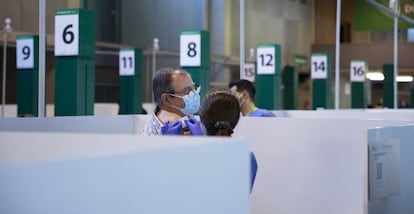Spain’s Andalusia region to allow travel between provinces again
The move, effective on Thursday, comes after over four months of closure due to coronavirus infections and less than two weeks before the national state of alarm is set to expire

Spain’s southern region of Andalusia will restore mobility between its eight provinces on Thursday, April 29. The decision comes over four months after regional authorities introduced travel restrictions in a bid to curb a new surge of the coronavirus.
Although the 14-day cumulative number of cases per 100,000 inhabitants is now 237, which is higher than what it was on March 19 (118), the Andalusian government has decided to ease restrictions due to the faster pace of the vaccination drive, the low Covid-19 hospitalization rates during this fourth wave and the advice of its expert health committee.
The sealed perimeters have forced many establishments to remain closed at a time of the year when they are almost all openStefan Declerck, president of the Cádiz hotel industry association
The decision comes amid the countdown to the end of the national state of alarm on May 9. This emergency measure was introduced by the central government to give the regions – which are in charge of controlling the pandemic as well as the vaccination drive in the territories – the legal backing to introduce coronavirus restrictions on fundamental rights, such as the curfew. After the state of alarm expires, travel restrictions are expected to be eased across Spain, although regional governments may retain the power to maintain some measures in place.
“During these months, and in order to deal with the fourth wave [of the virus], we decided to close the provinces, to give as much oxygen as possible to the hospitality sector and to vaccinate at the highest possible speed,” said Andalusian premier Juan Manuel Moreno, of the Popular Party (PP). Starting on Thursday, he added, “Andalusians are getting their freedom back.”
However, Andalusia’s regional perimeter will remain closed to inbound and outbound travel save for essential trips, and a 11pm-to-6am curfew will remain in place until Spain’s state of alarm is lifted. Businesses may remain open until 10.30pm, an improvement on the 8pm closing time imposed in several major cities on April 18. Municipalities with an incidence rate of over 500 cases per 100,000 will be confined although retail stores may open for business.

Andalusia sealed off its provinces on January 17 due to the “explosive growth” of the third wave of the coronavirus following the Christmas season. At that time, the incidence rate was nearly 464. Andalusia was also the only region of Spain to forbid inter-provincial travel during the Easter holidays.
The eased travel conditions will provide some relief to Andalusia’s struggling hotel sector. “The sealed perimeters have forced many establishments to remain closed at a time of the year when they are almost all open,” said Stefan Declerck, president of the Cádiz hotel industry association and vice-president of the Andalusian Federation of Hotels and Tourist Accommodation.
The reopening of provincial travel and the end of the national state of alarm have raised the sector’s expectations, although industry leaders remain cautious. “We are starting to see a rise in bookings, but not at the normal rate for this time of the year, so it is still too early to make forecasts,” said Declerck.
The sector is expecting mostly domestic tourism this coming summer, and a spike in international visitors in September or October. “We are counting on 80% occupancy rates at coastline hotels in June, July and August,” added Declerck.
Spain introduces 10-day quarantine on travelers from India
As of May 1, all travelers coming from India to Spain must go into quarantine for 10 days. The measure is aimed at controlling the spread of the new coronavirus strain detected in that country, which has seen a dramatic rise in cases. The new rules were published in the Official State Gazette on Wednesday and will be in place for 14 days.
English version by Susana Urra.
Tu suscripción se está usando en otro dispositivo
¿Quieres añadir otro usuario a tu suscripción?
Si continúas leyendo en este dispositivo, no se podrá leer en el otro.
FlechaTu suscripción se está usando en otro dispositivo y solo puedes acceder a EL PAÍS desde un dispositivo a la vez.
Si quieres compartir tu cuenta, cambia tu suscripción a la modalidad Premium, así podrás añadir otro usuario. Cada uno accederá con su propia cuenta de email, lo que os permitirá personalizar vuestra experiencia en EL PAÍS.
¿Tienes una suscripción de empresa? Accede aquí para contratar más cuentas.
En el caso de no saber quién está usando tu cuenta, te recomendamos cambiar tu contraseña aquí.
Si decides continuar compartiendo tu cuenta, este mensaje se mostrará en tu dispositivo y en el de la otra persona que está usando tu cuenta de forma indefinida, afectando a tu experiencia de lectura. Puedes consultar aquí los términos y condiciones de la suscripción digital.








































